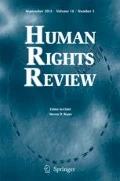Abstract
Consequentialist cosmopolitanism, Peter Higgins argues, enables closed border liberals to evade charges of moral hypocrisy despite their commitment to moral equality of individuals, once we recognize that open border arguments rely on cosmopolitanism’s individualism requirement, which ignores social realities relevant to a realistic assessment of the social consequences of an open immigration policy. Higgins is mistaken, however, in contending that cosmopolitan individualism entails attention to people only in their capacity as the abstract atomic individuals populating Charles Mills’ idealized social ontologies. Conversely, if cosmopolitan individualism does compel us to think of people as abstract atomic individuals, we are not obliged to think of them as relatively privileged. Under liberal cosmopolitanism, however, which prohibits state discrimination between citizens and non-citizens, open border policies are subject to no such consequentialist objections.
Similar content being viewed by others
Notes
Thomas Pogge, World Poverty and Human Rights (Maldon, MA: Polity Press, 2002), 169. (See Higgins’ discussion above.)
Will Kymlicka, “Territorial Boundaries: A Liberal Egalitarian Perspective,” in David Miller & Sohail H. Hashmi (eds.), Boundaries and Justice: Diverse Ethical Perspectives (Princeton: Princeton University Press, 2001). Joseph Carens, “Aliens and Citizens: The Case for Open Borders,” in David Jacobson (ed.), The Immigration Reader: America in a Multidisciplinary Perspective (Malden, MA: Blackwell, 1998).
Higgins attributes this view to Phillip Cole. See Higgins above, note 5.
Charles Mills, “‘Ideal Theory’ as Ideology,” Hypatia 20, n.3 (Summer 2005), 168. (Again, see Higgins’ discussion above.)
Pogge himself is quite clear about this: “the ultimate units of concern are human beings, or persons—rather than, say, family lines, tribes, ethnic, cultural, or religious communities... The latter may be of concern only indirectly, in virtue of their individual members or citizens.” (Pogge, 169)
Will Kymlicka and Joseph Carens, Higgins’ particular examples of consequentialist cosmopolitans, are equally clear on the limitations of consequentialist arguments. Kymlicka and Carens do not seem to be presupposing, any more than Pogge, that the individual subjects of consequentialist evaluation are to be conceived of as abstract atomic individuals. Thus, Kymlicka takes account of the social situatedness of third-world populations when he argues that parties in the original position would not choose an open borders policy in part because: “open borders would be of no use to the very poorest, who cannot afford a ticket to fly from Mozambique to Germany.” (Kymlicka, 270–71) Carens argues similarly, at 374–75:“Under non-ideal conditions it can sometimes be justifiable to restrict liberty for the sake of economic gains, if that will improve the position of the worst-off…Would it be justifiable to restrict immigration for the sake of the worst-off?.. If rich states are really concerned with the worst-off in poor states, they can presumably help more by transferring resources and reforming international economic institutions than by restricting immigration... Perhaps the ones who come [under unrestricted immigration policies] are not the worst-off, however. It is plausible to suppose that the worst-off don’t have the resources to leave. That is still no reason to keep others from coming unless their departure hurts those left behind. But let’s suppose it does, as the brain-drain hypothesis suggests...”
New York: Cambridge University Press, 1982.
Cambridge, MA: Harvard University Press, 1971.
Author information
Authors and Affiliations
Corresponding author
Rights and permissions
About this article
Cite this article
Nunan, R. Open Immigration Policies and Liberal Discomfort. Hum Rights Rev 9, 537–541 (2008). https://doi.org/10.1007/s12142-008-0069-z
Received:
Accepted:
Published:
Issue Date:
DOI: https://doi.org/10.1007/s12142-008-0069-z




